The Neighbours Always Do It Better
Adelina Marini, May 9, 2012
 In Bulgaria we have a saying that the neighbours always do better. It has its psychological background but nonetheless it is very useful to know what do your neighbours do and if you can, to take a good example or to avoid the bad things. Nationally we always watch with greed the well developed and settled countries, the achievements of which we will hardly repeat in a life time, especially with the speed Bulgaria does things. That is why it is better if you watch your neighbours. I have passed through Belgrade tens of times en route to Western Europe but since my childhood I have not visited the city itself. It was enough for me to reach to the conclusion that the neighbours do better only by watching the pace of construction of their motorways, how they upgrade their roads with all the deficiencies that can be seen, especially if one comes from the better developed part of Europe. But let's leave that part aside for the purposes of the comparison and focus only on neighbouring Serbia.
In Bulgaria we have a saying that the neighbours always do better. It has its psychological background but nonetheless it is very useful to know what do your neighbours do and if you can, to take a good example or to avoid the bad things. Nationally we always watch with greed the well developed and settled countries, the achievements of which we will hardly repeat in a life time, especially with the speed Bulgaria does things. That is why it is better if you watch your neighbours. I have passed through Belgrade tens of times en route to Western Europe but since my childhood I have not visited the city itself. It was enough for me to reach to the conclusion that the neighbours do better only by watching the pace of construction of their motorways, how they upgrade their roads with all the deficiencies that can be seen, especially if one comes from the better developed part of Europe. But let's leave that part aside for the purposes of the comparison and focus only on neighbouring Serbia.
The country is very good for comparison not only because it is a neighbour but also because it is very similar in terms of population - 7.5 mn people (in Bulgaria it is approximately the same number), similar history, the same religion (Orthodox Christianity), proximity of language. There are, however, essential differences which Belgrade quickly reveals.
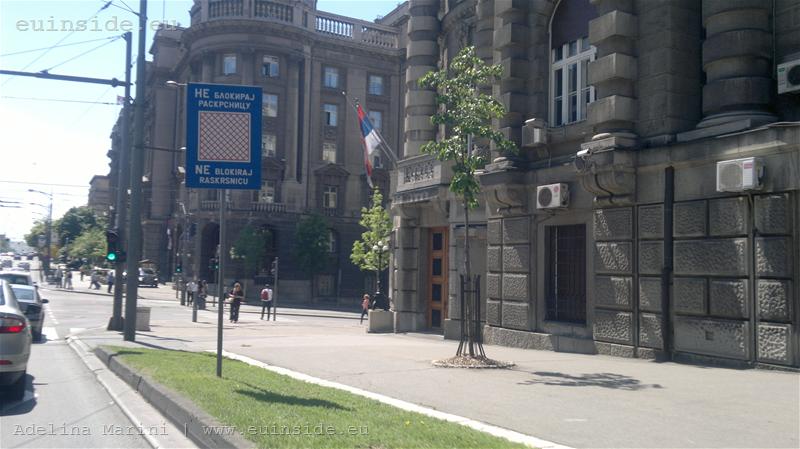
First, I have to say right away that I am a person who enjoys driving, but who avoids doing it in Sofia and Bulgaria in general because of the disastrous level of driving culture, the total lack of rule of law and the tragic state of the infrastructure. One of the things I detest is to get into a blocked juncture, because then I can't stop asking my fellow drivers why, since they will be waiting they do not do it before the traffic lights instead the middle of the juncture, where they prevent all the rest to cross. In Belgrade, obviously they asked the same question and the local authorities found a very tricky solution. Before every juncture there is a special table, calling against blocking the juncture and the juncture itself is painted in red lines. I don't know if there is a punishment for violating this call, but it was rare to see cars in the middle of the juncture, while it is green for the others.

In general, blocking junctures is forbidden in Bulgaria too but it is only on paper and I even doubt that this is being taught to beginners. Even less is our police dealing with this problem. I haven't seen so far a campaign "Don't block junctures!". Instead, there are only campaigns for safety belts, alcohol and speed. Not that these problems are not important but they are not the only ones. The situation at the junctures is very unpleasant, especially in Sofia, where one can sit for 2 or three changes of the traffic lights, before successfully crossing a juncture, because it is blocked by the more intense direction.
This is why I think that in Belgrade they have found a really good solution to the problem. Moreover, the traffic there is as aggressive (even more) and arrogant to everything and everyone, which brings to the conclusion that this is now some kind of a super mentality culture, impossible to be applied here.
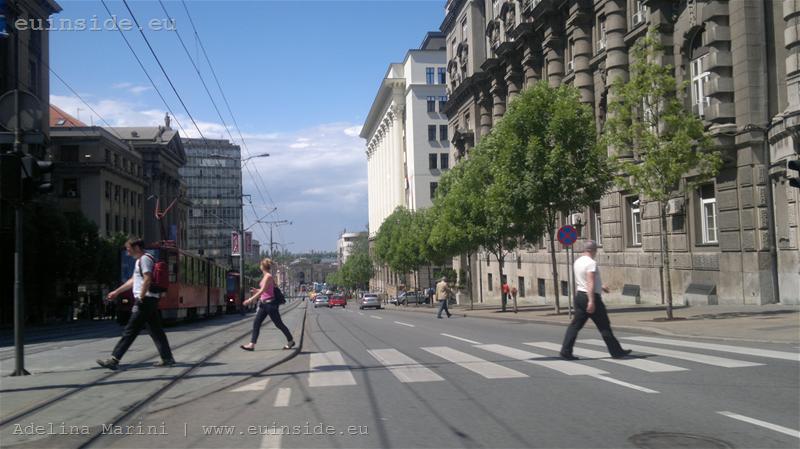
Another problem I have with the traffic in Sofia specifically are the sidewalks, especially when it rains. Here, as in Belgrade, it is a general practise the cars to park on sidewalks, which in Sofia leads to breaking the sidewalk tiles and that makes walking, already blocked by the cars themselves, even more difficult. Another problem is that usually, because of broken tiles, huge and muddy ponds emerge during rain and then walking and the desire to stay clean remains just a dream. In Belgrade (as in many other cities in Europe by the way) the problem is solved radically - the sidewalks are covered with asphalt. It's true that it is not ecological but is very practical and cheap, because laying tiles, aside from the fact that often it is not done with quality, it is also expensive (in terms of wages for the workers), and when it rains this becomes quite visible - you step on a tile, which is not stuck well and you're wet up to your knees. Asphalting sidewalks will solve the problem and will save money because it is meant to bear as heavy things as cars, while the tiles are designed for pedestrians.
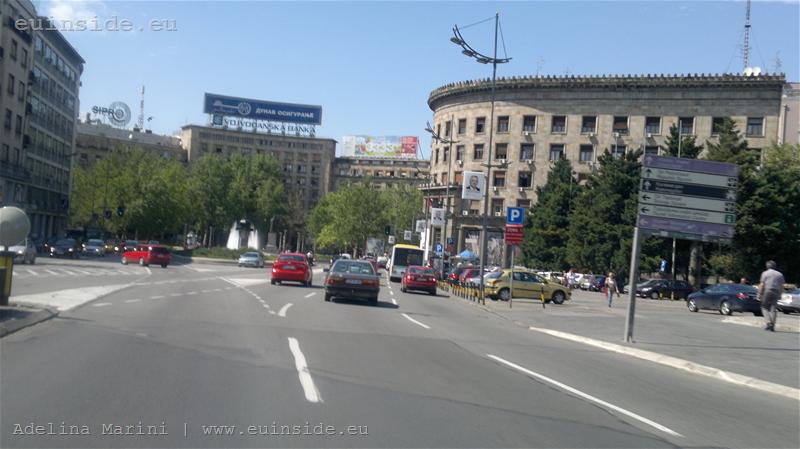
The third thing I always watch for when travelling, because I think it is very important, is marking. Street marking is not just design, the purpose of which is to make the streets look better. Its purpose is to organise the traffic better. I am always impressed by the markings in the developed European cities and towns (not only European but I am talking mainly about Europe, where one can freely drive from one end to the other), because they are not like ours. Special paint is used, which makes the marking much more dense and durable. Belgrade is not an exception. In spite of the many problems this city might have, as any other in the region, the markings are irreproachable and are all over the city - even on the small streets in the quarters that are far from the city centre.
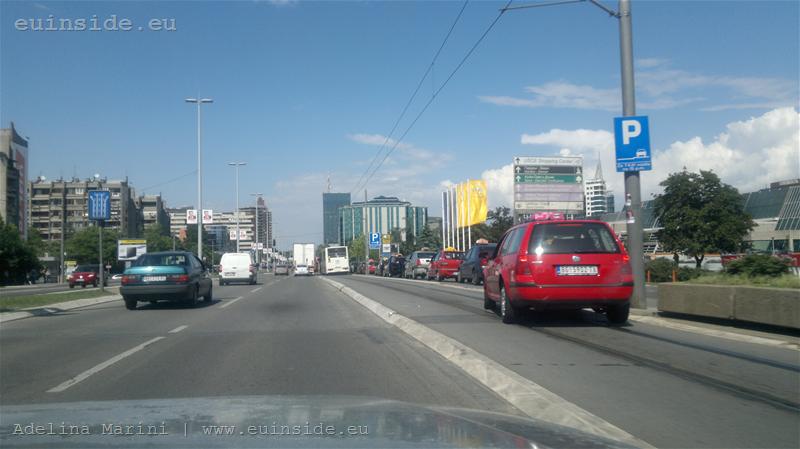
It is true that I spent only four days in Serbia's capital city but it happened so that I had the chance to drive literally all over the city. Each lane is well outlined, with the informative directions, the crosswalks are clearly visible, the public transport lanes (which include taxis) are coloured in yellow and in some parts are protected by concrete enclosure to prevent clever drivers from trying to cheat because they are the only ones in a hurry. I already told you about the junctures but separately from this, each lane is continued through the juncture to help drivers not lose sight of their route and avoid hitting the cars next to them. This really works on a subconscious level and everyone knows their place and drive without getting in the way of the others. I even believe that this increases speed because you don't need to slow down for fear that someone from the lane next to yours might hit you either because of not watching or because having to rely on their imagination where the lane should be.
And another smart thing our Western neighbours in Belgrade have introduced - the number of lanes can be changed depending on the traffic. For example, on one of their streets, where the traffic is very intense, there are traffic lights like those in the tunnels, which show how many lanes are open in your direction. This allows the local authorities to increase them in order to relieve the traffic.

Probably the people who know me well are already impatient why have I not mentioned stray dogs yet. There is not much to mention - they almost have none. For my entire stay I saw only 3-4 dogs, which were not in a pack and which did not look as if they are the owners of the city. I didn't even bother asking whether they had a problem with the stray dogs and how was it solved because it was evident that the people in the city when encountering a problem they tend to solve it instead of sweeping it under the carpet.
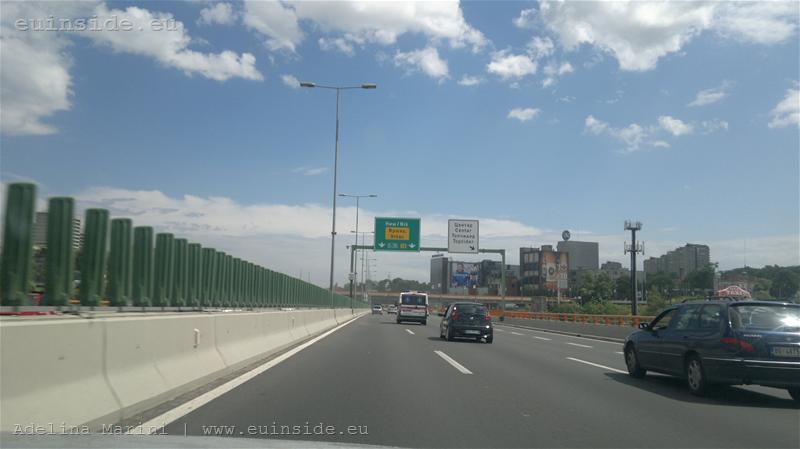
Last but not least, the Bulgarian driver's greatest nightmare is street holes and the tragic state of the road infrastructure in general. Usually we always try to calm ourselves, when comparing with developed European countries, that they do better because they are rich. The Serbs are not rich, on the contrary - they experience economic hardship, they lived through wars, bombings, the break-up of Yugoslavia and are definitely not in the best condition one can imagine. But their roads, although not at the best quality, compared to the Bulgarian, are just perfect. You will rarely see a hole in the streets of Belgrade, which makes driving there much better and pleasant, although this city has some tension in the air, like I said, because of the aggressive and arrogant behaviour of the drivers at large. But, after these small, at first sight, inconveniences are removed, driving is indeed much better.
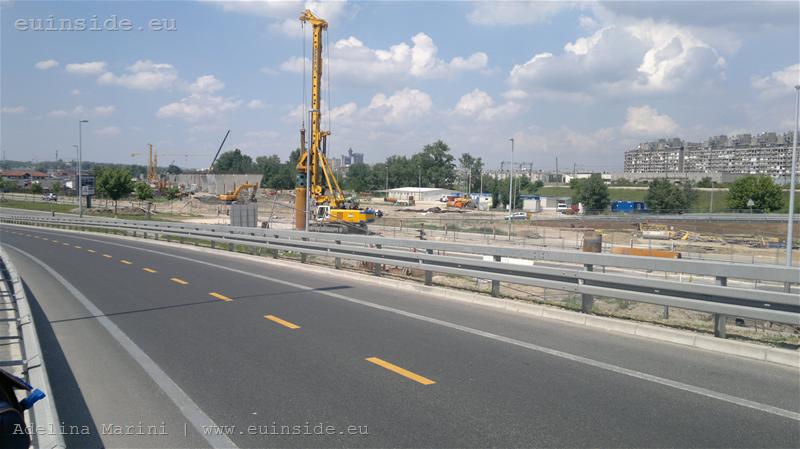
Not only that there are no holes but it is visible that the streets are regularly maintained. I remember that last year they were doing an overhaul of one of the main bridges in Belgrade, via which the entire traffic to Western Europe passes and which is popular with traffic jams. The repairs are over and were done under the book and at the moment this is a very nice place, which is not jammed to the surprise of friends of mine who associate passing through Belgrade with traffic jams. The construction of a new bridge is also under way in Belgrade. The construction works have started a year and a half ago and although many deadlines are not kept, as I was told by workers there, this period of time seemed to me very short, given the tremendous work they did for a year and a half.
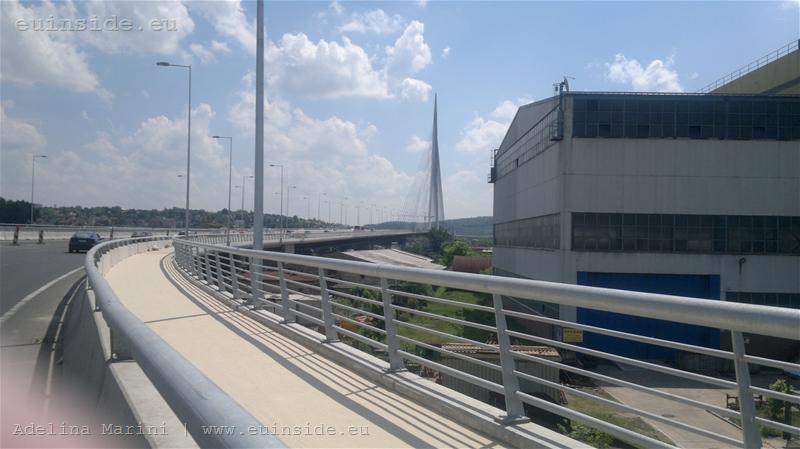
It was funny that while I was talking to one of the workers, he asked me where I was from. I told him and he exclaimed "Oh, Bulgaria, you are classes above us". I was surprised but then I realised why. According to him, since we are in the EU this means that we are just like the developed countries. A delusion which I had in the beginning too. I found it hard to convince him that in my country 32 km of a motorway are being built for 3 years now and that this is the topic of all topics - nothing else matters, while Sofia is like Beirut with, as we are often joke here, some asphalt on the streets. It was hard for him to believe but that's it - we always think that the neighbours do better.